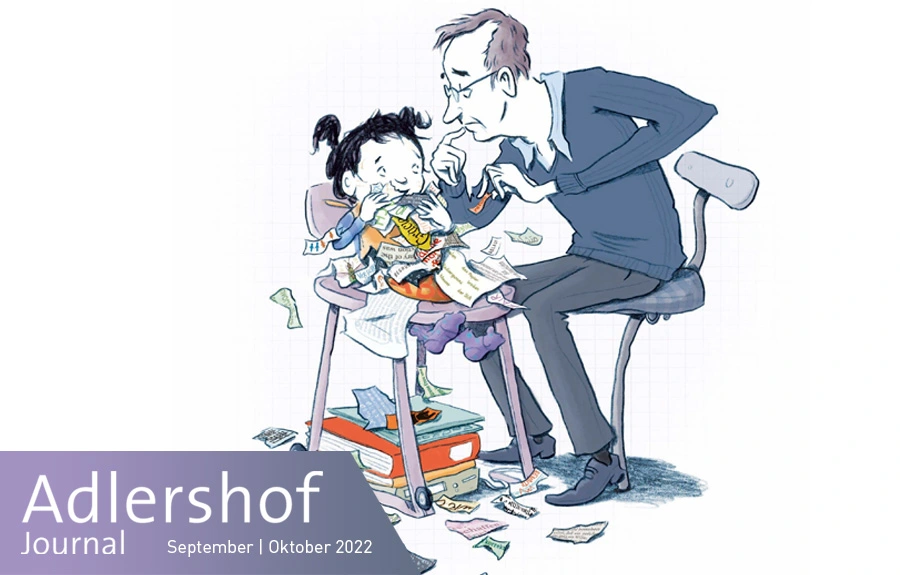What do I know?
Essay by Paulina Czienskowski, writer from Berlin
When did you last learn something new? A thought, an activity, a fact. I couldn’t think of anything if it weren’t for the fact that I recently gave birth to a child. Since then, I have been soaking up new things like a sponge. What lactation feels like, for example, or that a baby is born with four individual skull plates to make it easier to get through the birth canal. It also makes sure the brain has room to grow.
Since the child was born, new question marks have been popping up everywhere. I would argue it is the first time in a long time that I am continually exposed to insecurities that can only be subdued by active learning. Not that I have any other choice. After all, this creature must survive.
At the beginning of life, learning is instinctive. In their first years of life, children learn around eight words a day. With age, necessity transforms into something that requires a consciously invested interest. Staying consciously interested is unusual it seems, especially if something doesn’t concern us directly. We already know how to talk, swim, and cook. But isn’t that the key to eternal youth that so many are striving to find?
People who have children around them will see themselves reflected back to them and therefore inevitably learn more. About the world and one’s own perspective on it. Is there a possibility that it’s ossified, arrogant, outdated? It can be fun to (co)learn from the beginnings of young people. But without them, too, it is worth keeping an open mind, acknowledging the undulating complexity of the world, and staying intellectually flexible.
The writer Susan Sontag once wrote in an essay that the modern view of photography holds that “reality is by its very nature limitless, and that perception is an open-ended process.” We should continually remind ourselves of this open end, understand that our society in constant motion, and renew ourselves in an equally constant fashion. If we insist on knowing everything already, because we have gone through life and beat it, we will not win. We will struggle to keep pace.
It also seems that there is a prevailing misunderstanding that what has been learned once stays valid forever. To be sure: If you know how to ride a bike, you won’t unlearn it. But what about theories about issues that have been put forward decades ago, which would have to be viewed critically in the context of contemporary history, if not be viewed as dangerous? Take great German thinkers like Kant or Hegel, for example, who are still read uncritically at universities despite peddling racist theories.
There is no arguing about this. On the contrary, this and other issues should be a consensus. Especially those relating to the dignity and well-being of people. Seemingly robust scientific findings are not set in stone. They always reflect our knowledge at a certain point in time. If the data changes, researchers reassess a situation and correct errors. Very few things in the world stand so firmly that they should be considered cemented forever. It is customary for researchers to contradict each other. In the early 20th century, Pierre Duhem, a French physicist, stated that one could match an infinite number of theories to one observation. For example, it is still debated today whether we have an innate sense of quantity, something the brain researcher Stanislas Dehaene put forward in 1997.
Nevertheless, it is understandable that those who deconstruct what they have learned and thus also themselves – because the world changes, conditions shift, contexts wear out – could be less worried for the time being, because the image that we have created for ourselves is crumbling. What could be better than to just learn something new and establish a temporary order?
Clear images and ideas, writes Sontag, are what give shape and form to our experiences. And because they don’t last forever, it is worth staying vigilant and inquisitive. Professor Albus Dumbledore said to Harry Potter: “Youth cannot know how age thinks and feels. But old men are guilty if they forget what it was to be young.”
Paulina Czienskowski lives and works as a writer in Berlin. Her third book “Remembering Yourself to Be Yourself” was published in 2021. Her radio play, which is written from the point of view of a fetus on becoming human, was recently broadcast on Deutschlandfunk Kultur. It was also her directorial debut.
